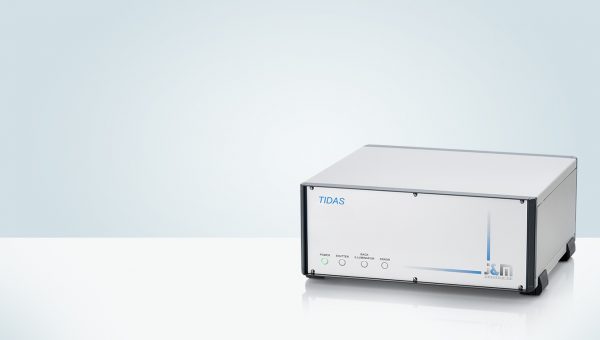TIDAS® S 500 – MCS NIR 6010
Spectrometer with diode array and ceramic optical bench optimized for multi-layer film thickness measurement.
TIDAS® S 500 – MCS NIR 6010
TIDAS® S 500 – MCS NIR 6010
Universal Spectrometers for Diverse Applications
The TIDAS® S spectrometers combine modularity, flexibility, ease of use and high quality. Their broad capabilities are demonstrated by the wide variety of applications including:
• Material Sciences (forensics, semiconductor technology)
• Quality Control (automotive, feed & food)
• Research (nanotechnology, rapid kinetics)
TIDAS® S spectrometers are available in various combinations of wavelengths and detectors. We offer a choice of selected UV/VIS and NIR detectors with wavelength ranges from 190 to 2200nm. The instruments are available with spectral detectors as well as with photomultipliers. According to your requirements we can supply TIDAS® S spectrometers with or without an integrated light source. Depending on the selected wavelength, the internal light source will be either a halogen, deuterium or deuterium/halogen combination. A coupling of spectrometers with different wavelength ranges is also possible.
The use of certified optical fibers in combination with optimized measuring cells allows the achievement of reliable measurement results. The instruments can be combined with various sample cells. Besides the measurement of transmission or reflections, fluorescence or emission measurement is also possible.
Since the TIDAS® S instruments use no moving parts, these spectrometers are extremely sturdy. Recalibrations are seldomly necessary and a reliable performance over a long period of time is guaranteed. A highlight of the TIDAS® S series are the instruments for fast kinetic measurements. A maximum of 2000 acquired spectra per second guarantees optimal temporal resolution for your measurements.
The TIDAS® S 500 is a spectrometer with diode array and ceramic optical bench optimized for multi-layer film thickness measurement. It comes equipped with a MCS detector with a wavelength range of 690-1100 nm.
Plug und Play – with help of standard accessories the TIDAS® S sits ready to be immediately operational
Increased Flexibility – can be combined with other TIDAS® S spectrometers to one detector system
Diode Array Technology – enables quick and precise measuring with a low level of scattered light
Software – modular and user friendly, permits the data acquisition and evaluation of individual tasks
With the TIDAS® S, the following measurement setups are possible without any need for instrument modification:
- External measurement setups, for example using immersion probes or flow cell measurements
- Layer thickness measurement through white-light interference
- Colour measurement and evaluation
- Absorption and fluorescent measurement
- Scattered light measurement
Selected measurement cells, light guides and ready-to-use applications complete the programm range.

All connectors of the TIDAS® S instruments are mounted on the backside of the instrument to ensure a clean and organised working space in your laboratory.
Another highlight of the TIDAS® S instruments is the single Ethernet interface which allows them to be easily incorporated into existing network environments. Trigger and control cables allow the coupling and control of external devices such as specimen or filter changers and light sources.
The TIDAS® S is a high quality, sensitive instrument with low noise and low drift. The TIDAS® S is a compact bench-top instrument which offers excellent value for money.
Features
- Fiber-optic diode-array spectrometer
- Supports external immersion probes, temperature-controlled cuvette holders and flow cells
- Supports external reflection measurement heads
- Perfoms film thickness measurement using white light interference
- Suitable for color measurement and analysis
- Chemometric modelling
- Certified instrument quality (e.g. wavelength and photometric accuracy)
- Available as faster version for kinetic measurements
Advantages
- Compact, rugged and transportable instruments
- No moving parts mean excellent reliability and less recalibrations
- Multimodal and combined methods
- High dynamic range
- Fast and reliable results
- Powerful, yet easy to use software
Technical Data
| Wavelength Range | 690 - 1100nm |
| Spectral Resolution | < 2nm |
| Wavelength Accuracy | < 0.5nm |
| Wavelength Reproducibility | < 0.1nm |
| Baseline Drift | 5*10-4 AU/h according to ASTM E685 |
| Signal-to-noise Ratio | < 2*10-5 AU according to ASTM E685 |
| Number of Diodes (Pixels) | 512 |
| Illumination | 2 white LED, SMA 905 |
| Bench Space Requirements | approx. 35 x 32 15 cm (W x D x H) |
| Packaging Dimensions | approx. 80 x 60 x 60cm (W x D x H) |
| Weight | approx. 8kg net weight, 14kg gross weight |
| Power Supply | 85-265 VAC / 47-63 Hz |
| Interface | TCP/IP 10/100/1000 Mbit/s |
| Digital I/O | Standard: 2x IN / 2x OUT |
| A/D Converter | 16 bit |
| Optical Fiber Connection | SMA 905 |
| Supply Scope | power supply, RJ 45 patch cable, manual |
We reserve the right to make technical changes without any prior notice.
*1) Baseline drift will be measured at 580 nm after 10h warm up @ 21°C±2°C ambient temperature according to ASTM E685
*2) Noise will be measured at 580 nm after 10h warm up @ 21°C±2°C ambient temperature according to ASTM E685, without methanol flow with the following settings:
- Integration time <100ms
- Pixel bunching 1 (1×3.3nm ~ 4nm)
- Integration time x accumulation <2 sec.
- Detector saturation ~ 80%,


